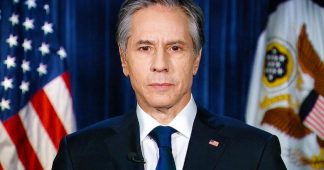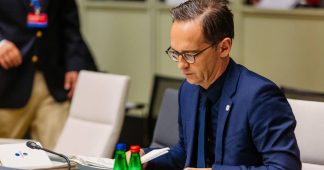Refusal to permit Estonia to transfer artillery that originated in Germany points to strains in Western alliance over Ukraine
By Michael R. Gordon
Germany is blocking North Atlantic Treaty Organization ally Estonia from giving military support to Ukraine by refusing to issue permits for German-origin weapons to be exported to Kyiv as it braces for a potential Russian invasion.
Unlike the U.S., Britain, Poland and other allies, the German government has declined to export lethal weapons directly to Ukraine.
In the case of Estonia, a small country on Russia’s northern border, Berlin is also refusing to allow a third country to send artillery to Ukraine because the weaponry originated in Germany, according to Estonian and German officials.
The issue is being seen by Western security specialists and Ukraine as a test of Berlin’s arms-transfer policy during a mounting crisis in Europe and points to the difficulties the U.S. and its European allies are facing in forging a common response to Russia’s military buildup near Ukraine and demands.
“Germany, they have a lot of hesitation to deliver to us,” Ukraine’s Defense Minister Oleksiy Reznikov said in an interview with The Wall Street Journal.
German officials said the impasse results from a longstanding policy regarding arms exports to tense regions.
“The principle governing arms exports is always the same—whether they come directly from Germany or from third countries—and no permission has been issued at this stage,” a German government spokesman said. “It is not possible to estimate the outcome of the process at this moment,” he added.
An Estonian government official said that his government is still trying to persuade Germany to change its mind.
“Hopefully we will get the approval from Germany,” Kristo Enn Vaga, adviser to the Estonian defense minister, said. “Estonia has shown that we want to help Ukraine in practical terms in any way we can.”
Ukrainian officials said that any arms are desperately needed and that allowing Estonia to send the artillery pieces could be precedent for sending additional German-origin systems from other countries. While the Estonian weapons wouldn’t change the dynamics on the battlefield, Germany’s refusal could be read by Moscow as another sign of division in the West’s ranks.
Broader strains within the Western alliance have emerged in recent weeks over how to assist Ukraine and what to include in the severe economic penalties U.S. and European officials have said will be imposed if Russia attacks Ukraine.
French President Emmanuel Macron earlier this week proposed that the European Union formulate a separate policy toward Russia to be coordinated with NATO.
The U.S. has also been seeking a German commitment not to permit Nord Stream 2, a Russian-built natural gas pipeline, to operate in the event of Russian aggression. German Chancellor Olaf Scholz has said that there will be a high cost for Moscow in the event of military aggression, but hasn’t firmly committed to halting the pipeline.
At issue with Estonia are exports of the D-30, a howitzer that fires a 122-mm shell around 20 kilometers. The howitzers, originally made in the Soviet Union, were stationed in former East Germany. After German reunification, Berlin exported the guns to Finland in the 1990s, which then passed them on to Estonia in 2009, Estonian, Finnish and German officials said.
“This is an early test for the new chancellor to show that his coalition can respond to an international crisis,” said Michael O’Hanlon of the Brookings Institution, a Washington policy research center. “If he can’t make this kind of modest change in the law, it calls into question his foreign policy leadership skills.”
Estonia in recent weeks has sought permission from Berlin to send the artillery units to Ukraine, which is required under Germany export laws, the German and Estonian officials said. Finland, which isn’t a member of NATO, is also required to authorize the delivery of the weapons by agreement with Germany. A spokesman for the Finnish government said that the procedure was a mere formality unrelated to the current situation in Ukraine.
Germany is one of the world’s largest arms exporters and ships weapons to non-allied countries such as Egypt or Pakistan. German officials have said however, that exporting arms to Ukraine is out of question due to the current tensions and because of Germany’s role in starting World War II and the Nazi atrocities committed in the region.
“Our restrictive position is well known and is rooted in history,” Annalena Baerbock, Germany’s foreign minister, said Monday in Kyiv as she stood beside her Ukrainian counterpart.
Dmytro Kuleba, Ukraine’s foreign minister, sought to play down the dispute, saying his nation’s “dialogue with Germany on this issue will continue.”
Ukraine’s ambassador to Germany, Andrij Melnyk, was more blunt: “This responsibility should be toward the Ukrainian people, who lost at least 8 million lives during the Nazi occupation of Ukraine.”
As small nations with little arms industry of their own, Estonia and the other Baltic states have sought to help Ukraine by transferring weapons that they acquired from NATO allies. Earlier this week, the U.S. authorized Baltic nations to send American-made weapons to Ukraine.
With U.S. approval, Estonia will provide Javelin anti-armor missiles, while Latvia and Lithuania will provide Stinger antiaircraft missiles and other equipment to bolster Ukraine’s defensive military capabilities, officials from those countries said.
Estonia is also giving substantial cyber-defense support to Ukrainian armed forces, which have been targeted by Russian cyberattacks, said Mr. Vaga, the Estonian adviser. Estonian specialists, who are among NATO’s most experienced in dealing with Russian cyber-aggression, are now providing know-how to their Ukrainian counterparts, he said.
Estonia is also providing a field hospital to Ukraine in March, Mr. Vaga said. Estonia will also provide training for how to use the hospital to Ukrainian armed forces.
“Blocking arms exports at a time when Ukraine is facing invasion is not a good policy,” said Gustav Gressel, a Berlin-based senior fellow with the European Council on Foreign Relations, a pan-European think tank.
—Vivian Salama in Kyiv, Ukraine, contributed to this article.
Published at archive.vn
We remind our readers that publication of articles on our site does not mean that we agree with what is written. Our policy is to publish anything which we consider of interest, so as to assist our readers in forming their opinions. Sometimes we even publish articles with which we totally disagree, since we believe it is important for our readers to be informed on as wide a spectrum of views as possible.











